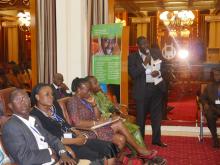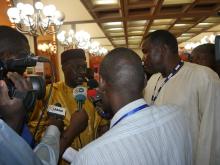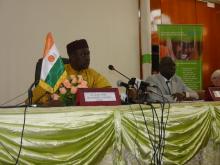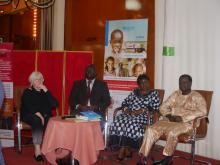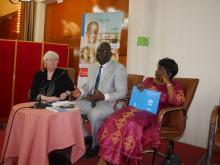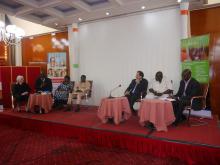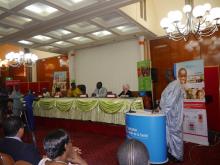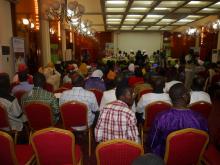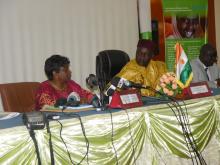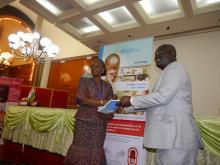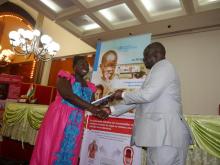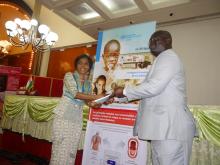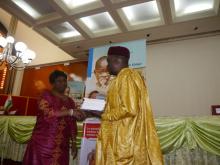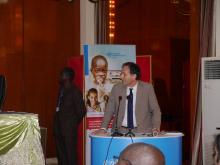WHO launches a manual proposing effective and sustainable oral health solutions for Africa
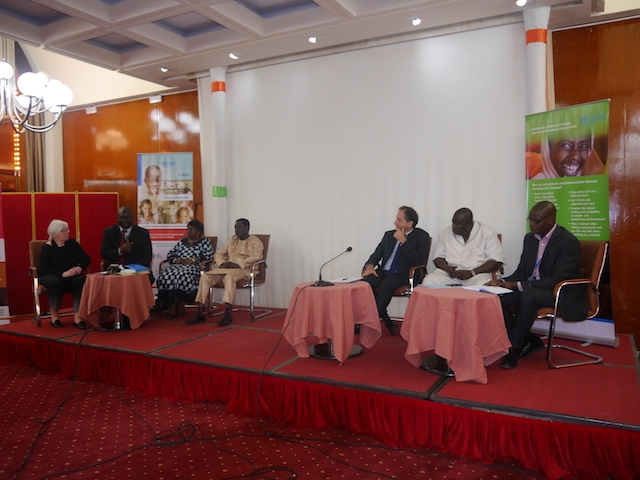 Niamey, 4 May 2016 - Today, WHO launched a manual that demonstrates how States in the African Region can improve oral health, especially in primary healthcare centres, schools and communities. The publication entitled Promoting oral health in Africa: Prevention and management of oral diseases and noma as essential interventions against noncommunicable diseases, proposes proven interventions that are affordable and feasible to address the daily oral health needs of the population.
Niamey, 4 May 2016 - Today, WHO launched a manual that demonstrates how States in the African Region can improve oral health, especially in primary healthcare centres, schools and communities. The publication entitled Promoting oral health in Africa: Prevention and management of oral diseases and noma as essential interventions against noncommunicable diseases, proposes proven interventions that are affordable and feasible to address the daily oral health needs of the population.
According to Dr Matshidiso Moeti, WHO Regional Director for Africa, "Oral diseases cause unbearable pain to millions of people and lead to death in some cases". In an address delivered on her behalf by Dr Diarra-Nama Alimata J., Coordinator of the Inter-Country Support Team for West Africa, Dr. Moeti added that "the majority of the population has little or no access to appropriate oral health care, owing to the uneven distribution of oral health workers and the lack of functional and adapted infrastructure within the primary health care system".
The Regional Director urged Member States to give greater priority to oral diseases and other noncommunicable diseases in their national health plans. “I also invite both public and private sector partners to financially support the efforts of those countries that are battling on several fronts. WHO, for its part, will provide the necessary technical assistance to facilitate the adaptation and implementation of interventions at the operational level,” she added.
The manual demonstrates that it is possible to reduce the burden of oral diseases, including noma (a gangrenous ulcerative infection that is especially rampant in West Africa and mainly affects children under the age of six years), and that of other noncommunicable diseases through an integrated approach, by addressing the risk factors common to these infections. Such factors include, all forms of tobacco use, alcohol abuse and poor nutrition which are the key modifiable risk factors that need to be reduced. The publication also highlights the fact that oral health improvement is a crucial element of essential interventions at the primary health care level and in schools.
In his address during the ceremony, Mr Kalla Moutari, Minister of Public Health of Niger, stated that the new WHO manual is "both an operational and educational reference tool, made available to policymakers, health professionals, dental surgeons, doctors, nurses, as well as education sector and community stakeholders", adding that the publication "is, without doubt, a major step towards attainment of the objectives of promoting oral health and eradicating Noma".
Oral health practitioners, public health experts, educators and governments, as well as public and private sector partners throughout the Region, will find information in this book that is relevant to their work.
The launching ceremony was attended by a large number of personalities, including ambassadors accredited to Niger, heads of United Nations agencies, directors from the ministry of health, NGO representatives, members of the National Order of Dental Surgeons in Niger and national oral health coordinators from eleven countries of the West and Central African regions.
It should be noted that Ms Ute Winkler-Stumpf, President of the Hilfsaktion Noma e.V. Foundation, which provided financial support for the production of the manual, received a testimony of satisfaction from the State of Niger, delivered by the Minister of Public Health, Mr. Kalla Moutari, in recognition of 20 years of this NGO's efforts in combating noma in Niger and in Africa.
Promoting oral health in Africa
For more information, please contact:
Technical contact:
Dr Benoit VARENNE, Regional Oral Health Adviser, Noncommunicable Diseases Cluster, WHO Regional Office for Africa, Brazzaville, Republic of Congo
Tel.: + 242 057 226 429, Email: varenneb [at] who.int (varenneb[at]who[dot]int)
Media contact:
Collins BOAKYE-AGYEMANG, Regional Communication Adviser, WHO Regional Office for Africa, Brazzaville, Republic of Congo
Tel.: + 242 06 520 6565, Email: boakyeagyemangc [at] who.int (boakyeagyemangc[at]who[dot]int) Cette adresse email est protégée contre les robots des spammeurs, vous devez activer Javascript pour la voir.
Fabienne ABOUA, Communication Officer, WHO Regional Office for Africa, Brazzaville, Republic of Congo
Tel.: +242 056627568, Email: abouaf [at] who.int (abouaf[at]who[dot]int) Cette adresse email est protégée contre les robots des spammeurs, vous devez activer Javascript pour la voir.
Abdoulhakim MOKHTAR MOHAMED, Communication Officer, Niamey, WHO/Niger
Tel.: + 227 92 19 95 45, Email: mokhtarmohameda [at] who.int (mokhtarmohameda[at]who[dot]int) Cette adresse email est protégée contre les robots des spammeurs, vous devez activer Javascript pour la voir.
Hilaire DADJO, Communication Officer, WHO Inter-Country Support Team for West Africa, Ouagadougou/Burkina Faso
Tel: +226 70 99 77 11, Email: dadjoh [at] who.int (dadjoh[at]who[dot]int)



